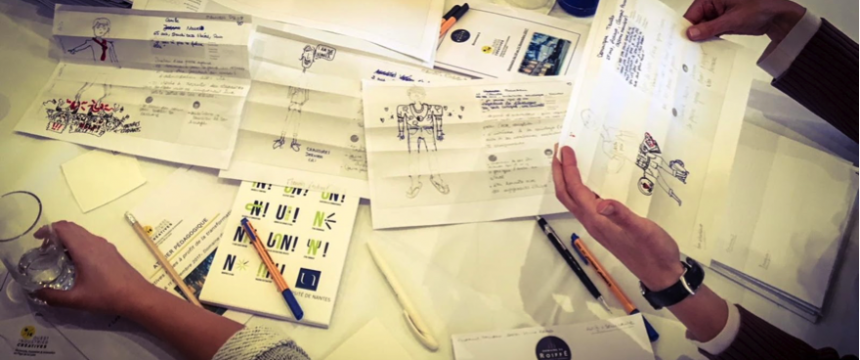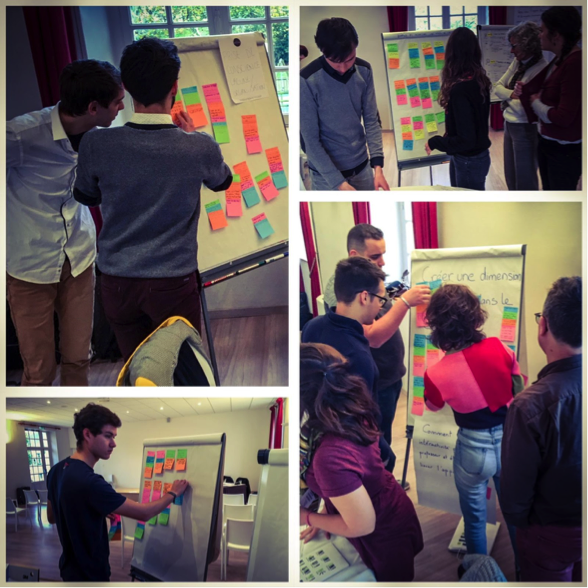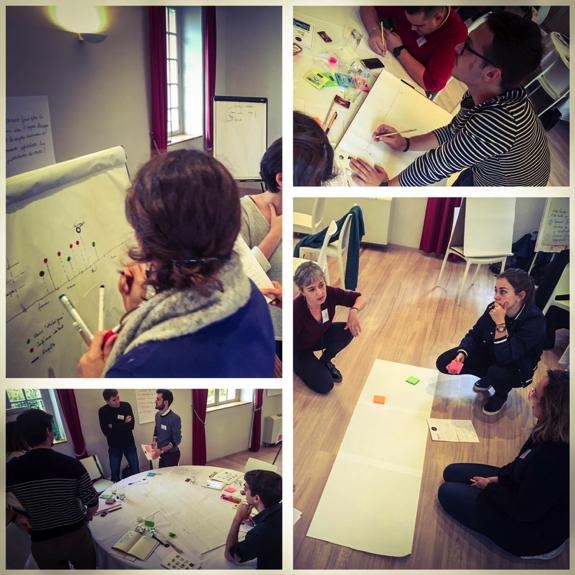On 10 and 11 November 2017, some 30 people from the Ouest Industries Créatives network (lecturers, students, engineers and educational advisers) took part in a workshop on the theme of transforming pedagogy through design. This first of its kind event took an innovative format and brought together the Université de Nantes (Polytech and Centre de Développement Pédagogique), the École de Design Nantes Atlantique, the Université d’Angers and the École Nationale Supérieure d’Architecture de Nantes. The workshop was facilitated by Laurent Neyssensas, head of the curricular innovation unit at the École de Design Nantes Atlantique.
The proposal comes under RFI Ouest Industries Créatives’ Education remit and expands on the “Crossroads Between Design and Teaching Methodology” workshop which was held on 20 October 2017.
An experimental approach
Five lecturers from the Ouest Industries Créatives network had decided to transform their respective lesson formats using creative approaches:
- Geneviève Correia: “Project Management” (L’École de Design Nantes Atlantique),
- Pauline Ouvrard and Bettina Horsch: “The Worlds of Architecture” (École Nationale Supérieure d’Architecture de Nantes),
- Dominique Sagot-Duvauroux: “Introduction to Public and Budgetary Economics” (Université d’Angers),
- Sébastien Le Nours: “Design of Digital Circuits” (Polytech, Université de Nantes).
The workshop leaders, who are experts in education and design, began by forming groups containing a mix of participants from the different institutions. Each group was asked to quickly identify a working issue. Emmanuel Raillard, a consultant in creative and innovation strategies, explained: “In the morning, taking a collective intelligence approach, students and lecturers worked together to discuss and develop a shared vision and a key theme to focus on over the two days”.
Creativity at the centre of educational transformation
Combining time working in groups and time for collective feedback, the workshop’s goal was to develop solutions to overcome common educational problems such as students losing attention, perceived difficulties about the work to be done, and inappropriate use of tools. Using the design method for guidance, each group played an active role in overhauling a lesson plan.
The aim of this unique workshop was to build bridges between Design Thinking and Pedagogy: “It’s an opportunity to apply creative thinking to pedagogical development and to think of a different way to plan, deliver and evaluate education” explained Christelle Lison, Associate Professor in the Department of Pedagogy at the Université de Sherbrooke.
The design approach in action
On the first day, participants concentrated on pinpointing problematic scenarios, developing personas (fictional characters representing archetypal individuals or groups involved in the situation in question) and journey maps/timelines.
On the second day, through sessions on brainstorming, selecting ideas, scripting and production, the groups used this detailed analysis of teaching approaches to come up with solutions.
Support from the Centre for Pedagogical Development at the Université de Nantes
To share expertise and disseminate the method tested more widely, the workshop was supported by the Centre for Pedagogical Development (CDP) at the Université de Nantes. Arnold Magdelaine, CDP director, Anne-Céline Grolleau, pedagogical adviser at the CDP and Audrey Péculier, instructional engineer for the Polytech network’s AVOSTII project shared their educational expertise with each of the groups.
Practical solutions
At the end of this creative marathon, every lecturer left with solutions that could transform their educational approach, such as:
- an online space for collaborative work,
- a database on MADOC (quiz, technical glossary and discussion forum),
- changing the room layout part-way through the class,
- a debating sequence based on the image of the day (“debatathons”),
- a set of appropriation of the project management framework note.
They have already incorporated some of these solutions into their lessons and will introduce others at the start of the 2018-2019 academic year.
Want to get involved?
Given the success of this initial workshop, Ouest Industries Créatives plans to repeat the experiment with a new group of volunteers in autumn 2018.
Are you interested in taking part in this type of event? Is your institution an RFI Ouest Industries Créatives partner?
Contact us now: carole.pierre@univ-nantes.fr / 02.40.68.32.38




